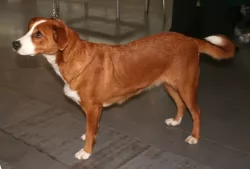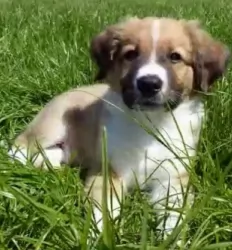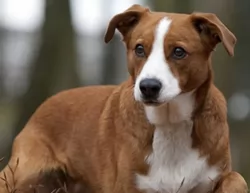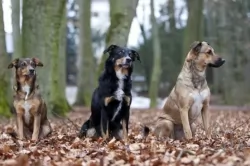 MyDogBreeds
MyDogBreeds Spanish Pointer is originated from Spain but Osterreichischer Kurzhaariger Pinscher is originated from Austria. Spanish Pointer may grow 17 cm / 7 inches higher than Osterreichischer Kurzhaariger Pinscher. Spanish Pointer may weigh 10 kg / 23 pounds more than Osterreichischer Kurzhaariger Pinscher. Both Spanish Pointer and Osterreichischer Kurzhaariger Pinscher has almost same life span. Both Spanish Pointer and Osterreichischer Kurzhaariger Pinscher has same litter size. Spanish Pointer requires Low maintenance. But Osterreichischer Kurzhaariger Pinscher requires Moderate maintenance
Spanish Pointer is originated from Spain but Osterreichischer Kurzhaariger Pinscher is originated from Austria. Spanish Pointer may grow 17 cm / 7 inches higher than Osterreichischer Kurzhaariger Pinscher. Spanish Pointer may weigh 10 kg / 23 pounds more than Osterreichischer Kurzhaariger Pinscher. Both Spanish Pointer and Osterreichischer Kurzhaariger Pinscher has almost same life span. Both Spanish Pointer and Osterreichischer Kurzhaariger Pinscher has same litter size. Spanish Pointer requires Low maintenance. But Osterreichischer Kurzhaariger Pinscher requires Moderate maintenance
 The Spanish Pointer is a large hunting breed. The dog hails from Spain and it is believed that the dog was used to develop other pointing breeds.
The Spanish Pointer is a large hunting breed. The dog hails from Spain and it is believed that the dog was used to develop other pointing breeds.
It is popular in Spain but fairly unknown beyond Spanish borders. Known as the Burgos Pointer, the official name for the dog is Perdiguero de Burgos.
It is thought that the dog comes from mixing the Pachon Navarra and the Sabueso Espanol. The dog was developed to point out game so they have the typical longish head with the pointing tail.
 Hailing from Austria, the Osterreichischer Kurzhaariger Pinscher, better known as the Austrian Short-Haired Pinscher has always been depicted on paintings from the Baroque period.
Hailing from Austria, the Osterreichischer Kurzhaariger Pinscher, better known as the Austrian Short-Haired Pinscher has always been depicted on paintings from the Baroque period.
The dog is a terrier-type canine and has always been used as a watchdog but he was also used to hunt because of the terrier qualities he possesses.
This dog has always been used for working on farms. Breeding of this dog started in 1921 and the dog was recognized by the United Kennel Club in 2006.
 The body of this dog is true to the Pointer type of dog with the body being muscular and lean.
The body of this dog is true to the Pointer type of dog with the body being muscular and lean.
He stands at between 62 to 67cm in height and weighs about 25 to 30kg. The ears are quite long and floppy and the tail is usually docked to a third of its length.
The coat which is mostly short can be whitish with tan or brown markings with freckling or it can be a brownish shade with darker brown markings.
The Spanish Pointer is a quiet, calm, gentle dog and not at all aggressive. They’re able to get on well with children and other pets.
They’re dogs that love the great outdoors and aren’t suited to city living. They’re dogs that need a good deal of exercise too. Being intelligent the pointer dog will benefit from training and socialization.
 As a medium sized dog, both males and females stand at between 42 and 50cm in height and the dog weighs roughly between 14 and 20kg.
As a medium sized dog, both males and females stand at between 42 and 50cm in height and the dog weighs roughly between 14 and 20kg.
The coat is shortish, dense and smooth and is essentially black and tan with some white, fawn or brindle. The ears of the dog are fairly short and they look as though they wanted to be erect but then decided to be floppy. The nose is black and the eyes dark brown.
The tail is usually docked but when it is left long, it curls over the back. If you want your dog to be bred you can expect between 4 – 6 puppies.
These are playful dogs, getting on well with their human families and wanting to get involved in their activities. They are suspicious of strangers. They are good with kids, making them a good playmate, but they don’t like small children being allowed to climb over them.
They are able to get along well with any other pets in the house. It would be to your benefit to have the dog trained and socialized as he becomes obedient and good around people in social settings. He is an intelligent dog and will find training easy.
They also take their role as guardian and protector seriously.Because he was bred to be a farm dog, he wouldn’t e able to adapt to life on a tiny property in the city.
 Your attractive Spanish Pointer is such an amicable dog that it is a pleasure to have him around you.
Your attractive Spanish Pointer is such an amicable dog that it is a pleasure to have him around you.
He makes such a splendid pet, but only if their intense exercise needs are catered to. He can’t possibly be expected to spend days in a tiny yard with nothing to do. It would be cruel.
Their top priority is to be out in the fields hunting. Nonetheless he gets on well with children and other dogs, and with the right home and environment you’ll be so glad you chose one of these beautiful dogs as your friend.
 Have your Osterreichischer Kurzhaariger Pinscher trained and socialized if you want him to be amicable and obedient around you and your visitors.
Have your Osterreichischer Kurzhaariger Pinscher trained and socialized if you want him to be amicable and obedient around you and your visitors.
He does well with a human family who are firm, kind and patient with him. He loves to be kept busy with both mental and physical exercise, thriving on challenging activities, and he will become frustrated if he is left day after day just to lie around.
Take him with you on walks, buy him nice chewy, stimulating toys, throw a ball or frisbee with him and include him in your activities.
This is a dog more suited to life in the countryside as opposed to life in the city. Care well for this splendid family pet and you’ll quickly begin to see why dogs like him are known as man’s best friend.
 The Spanish Pointer is a healthy dog breed that can live to be as old as 15 if he gets the right care.
The Spanish Pointer is a healthy dog breed that can live to be as old as 15 if he gets the right care.
Like other dogs, they can develop certain health problems, and you want to be aware of cherry eye, ear infections, hip dysplasia and allergies.
These dogs just love to swim, and it can be difficult to keep the inside of his ears from moisture.
Unfortunately wax, dirt and moisture can all cause an ear infection. Ear infections can be extremely painful. You’ll see your dog shaking his head and pawing at his ears. There will be redness inside the ear and possibly a discharge too. He will need to see the vet.
 The Austrian Short-haired Pinscher is a robust kind of dog that isn’t going to have you rushing to the vet very often. True, he does have some hereditary health issues but it is highly unlikely that you will find these health issues in your pet.
The Austrian Short-haired Pinscher is a robust kind of dog that isn’t going to have you rushing to the vet very often. True, he does have some hereditary health issues but it is highly unlikely that you will find these health issues in your pet.
Nonetheless it pays to know about one of the more serious conditions -
This is a heart disease that is present from birth and could have been passed down from the parent dog to the puppy. A congenital heart defect occurs as a malformation of any valve, with the most common congenital heart diseases in dogs being patent ductus arteriosus, pulmonic stenosis as well as subaortic stenosis, all potentially inherited defects.
Sometimes a dog can live a fairly normal life with this disease but other times there are complications which can lead to congestive heart failure and atrial fibrillation, causing symptoms such as difficulty with breathing, cough and weakness. Your dog will need to get to the vet to discuss treatment options.
 As a hunting dog, the Spanish Pointer has always been used to a lot of exercise. If you don’t use him for hunting, you will need to take him on long walks. They just love sniffing around and following a scent. Ball and frisbee games where you get him running will be excellent for him.
As a hunting dog, the Spanish Pointer has always been used to a lot of exercise. If you don’t use him for hunting, you will need to take him on long walks. They just love sniffing around and following a scent. Ball and frisbee games where you get him running will be excellent for him.
The Spanish Pointer is a large hunting dog, so when you choose commercially manufactured dog food, make sure it’s for large breed dogs. Also make sure the food is for active dogs too.
The manufacturers of these dog foods know what vitamins and minerals to include for active dogs like these. Read the packaging carefully and avoid the inferior dog foods as they are full of ingredients that can make your dog sick.
Try and feed your Spanish Pointer some home-made food too. Make sure it isn’t spicy, exotic foods as these can cause digestive problems.
Food such as boiled chicken, brown rice or pasta, sweet potatoes, spinach and carrots are superb, simple food choices for your canine friend. You can chop it up and add some of this to the dry kibble twice a week as a treat for your pet.
Try and add some raw meat to the diet occasionally as this can be helpful in preventing skin infections.
The coat of your dog is short so a good brush twice a week will keep it in tip top condition. If he is super active, with a mitt or damp cloth you can wipe down his fur if it has mud stuck to it. It’s your time to check him over for ticks and fleas as well.
 They need quite a lot of exercise, and even though they can adopt to life in the countryside or the city, they will require regular walks, ball- and rope games to prevent them becoming bored, frustrated and destructive.
They need quite a lot of exercise, and even though they can adopt to life in the countryside or the city, they will require regular walks, ball- and rope games to prevent them becoming bored, frustrated and destructive.
The Austrian Short-haired Pinscher sheds quite a bit so he will need to be brushed at least twice a week to remove the loose hairs.
As a medium sized, energetic dog, you want to ensure you maintain your dogs energetic nature by providing him with excellent food.
Choose your commercially manufactured food carefully as some of them are of a poor quality and can actually be detrimental to your dog’s health. Choose a high quality kibble that has quality ingredients.
Home-made food such as boiled chicken, brown rice or pasta and vegetables such as carrots, spinach and sweet potatoes all chopped up and added to his kibble occasionally will do wonders for this dog. He will thrive on also getting in some raw meat from time to time.
Ensure a constant supply of fresh, cool water.